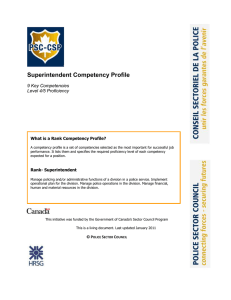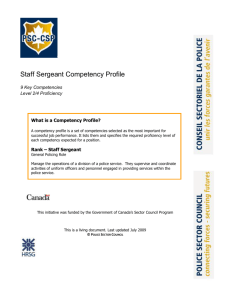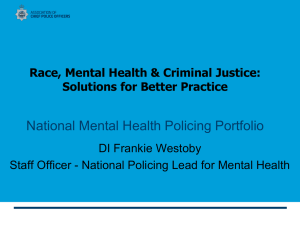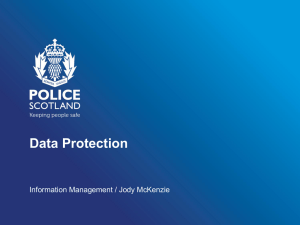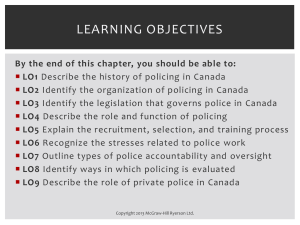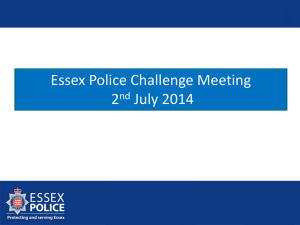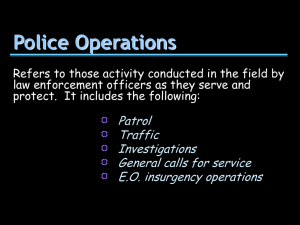Leadership Competency Profile for Senior Leadership
advertisement
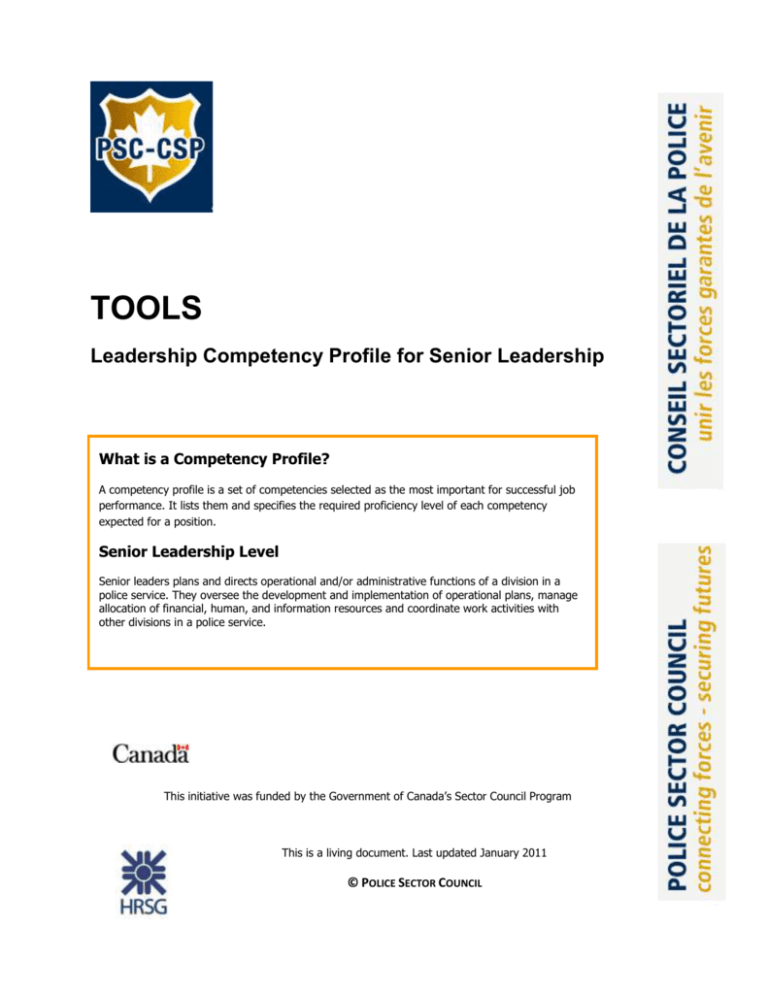
TOOLS Leadership Competency Profile for Senior Leadership What is a Competency Profile? A competency profile is a set of competencies selected as the most important for successful job performance. It lists them and specifies the required proficiency level of each competency expected for a position. Senior Leadership Level Senior leaders plans and directs operational and/or administrative functions of a division in a police service. They oversee the development and implementation of operational plans, manage allocation of financial, human, and information resources and coordinate work activities with other divisions in a police service. This initiative was funded by the Government of Canada’s Sector Council Program This is a living document. Last updated January 2011 © POLICE SECTOR COUNCIL 1 Leadership Competency Profile for Senior Leadership Competency Name and Definition Proficiency Level and Associated Behaviours CHANGE MANAGEMENT Facilitates the transition to new organizational processes in response to internal and external needs Plans change process (Level 4) Establishes a transition team for change implementation Directs the translation of organizational vision and strategies for change into specific goals Communicates the need to include strategies to address the people issues as well as the business change Approves communication and stakeholder engagement plans to support change initiatives Provides direction and support to the management team Formally acknowledges team contributions and celebrates key milestones with the transition team Establishes strategies to measure impact of change Develops change strategies based on change management theories and best practices COMMUNITY RELATIONS AND MEDIA MANAGEMENT Uses media and community events/resources effectively to create a positive public image of the police service, build strong relationships with the community, and to assist in the detection and investigation of crime Manages the organization’s public affairs and media relations strategy (Level 4) Establishes guidelines regarding the type and amount of organizational information that can be disclosed to the public Manages organizational relationships with the media Ensures centralized coordination of public affairs and media relations activities Communicates regularly with the media, e.g., holds press conferences Effectively manages media during major incidents Directs the public affairs and media relations strategy to be operationalized and communicated internally Evaluates impact of police public affairs and media relations campaigns Ensures police service is utilizing all available tools/technology to enable effective communication with all demographic groups DECISION MAKING Makes complex decisions in the face of ambiguity (Level 4) Makes complex decisions for which there is no set procedure Considers a multiplicity of interrelated factors for which there is incomplete and contradictory information Balances competing priorities in reaching decisions Makes decisions involving varied levels of risk and ambiguity ETHICAL ACCOUNTABILITY Takes responsibility for actions and makes decisions that are consistent with high ethical policing standards Sets the standard for policing ethics and values (Level 5) Communicates the organization’s values and ethics Ensures that standards and safeguards are in place to protect the organization’s integrity Develops policies and measures to integrate ethics within the organization (applies) Facilitates research on best practices Participates in defining ethical policing practice FINANCIAL MANAGEMENT Applies financial management principles and tools to effectively manage organizational resources (operating, capital, and people) Develops a financial strategy in the area of responsibility (Level 4) Works with management team to create a capital plan Identifies potential sources of funding for the organization Educates jurisdictional authorities about the nature of police business and its implications for financial planning and management Ensures the alignment of financial goals to business plan Consolidates data from each unit in area of responsibility Educates management team on goals of budget process, including the identification of performance indicators, development of planning tool for business unit managers; management of risks and opportunities as they arise, depiction of financial needs, and support of the business plan 2 Leadership Competency Profile for Senior Leadership Competency Name and Definition FOSTERING RELATIONSHIPS Seeks and builds alliances with internal and external stakeholders to meet their needs and further the organization's objectives. Uses an understanding of stakeholder needs, desires and critical success factors to influence priorities, initiatives and objectives and teaches other to do the same HUMAN RESOURCES MANAGEMENT Applies, implements, and directs the development of human resource management strategies, processes, policies, and practices INFORMATION TECHNOLOGY MANAGEMENT Maximizes the use of state-ofthe-art technology to support operational and administrative work of a police organization INTERACTIVE COMMUNICATION Utilizes communication strategies in an effort to achieve common goals, influence and gain others’ support ORGANIZATIONAL AWARENESS Understands and uses organizational awareness to deliver optimal services. Seeks to understand the critical concerns and most important issues of stakeholders to find optimal solutions PUBLIC ACCOUNTABILITY Works effectively within parameters of jurisdictional governance structure (local, municipal, regional, provincial, and national) and associated policing frameworks. Adheres to Proficiency Level and Associated Behaviours Sets strategic direction for partnering (Level 5) Establishes an infrastructure that supports effective stakeholder relationships Identifies and supports creative ways to partner with harder to reach stakeholders Profiles excellent examples of partnering within policing organizations and promotes them to other policing groups Directs the development of human resources processes (Level 4) Advises staff on the development of human resource processes and policies in the areas of recruitment, selection, training, promotion, and performance management Verifies that human resource management processes meet organizational objectives Initiates the development of a succession management plan Makes final decisions about appointments and terminations Identifies technology requirements (Level 4) Reviews the performance of technology in the police organization to determine if it meets public safety and organizational needs as well as legal guidelines Identifies areas of work where technology could improve efficiency Consults with stakeholders (e.g., employees, police services board members) to define technology requirements for the organization Communicates strategically (Level 5) Communicates strategically to achieve specific objectives Uses varied communication vehicles and opportunities to promote dialogue, shared understanding and consensus Understands the underlying needs, interests, issues and motivations of others. Interprets complex and possibly contradictory or competing signals/messages Gains support by capitalizing on the understanding of political forces affecting the organization Operates effectively in a broad spectrum of political, cultural and social milieu (Level 5) Demonstrates broad understanding of social and economic context that can impact policing work Understands and anticipates the potential trends of the political environment and the impact these might have on policing work Operates successfully in a variety of social, political and cultural environments Sets up internal structures of authority and facilitates relationships with external stakeholder (Level 4) Develops systems, policies and processes to ensure internal accountability in the organization as well as accountability to external stakeholders e.g. a centralized disciplinary authority to ensure consistency and accountability Ensures transparency of decision making in relations with other police services and organizations 3 Leadership Competency Profile for Senior Leadership Competency Name and Definition values of public service. Understands and uses internal and external structures of authority and understanding the roles and responsibilities of external stakeholders in police operations Proficiency Level and Associated Behaviours Assesses the internal structure of authority against relevant legislation PUBLIC SAFETY Promotes an intelligence-led and problem-oriented policing philosophy that emphasizes partnerships with community, intelligence gathering, and proactive problem-solving that addresses conditions that can raise issues for public safety Builds structures, systems and processes to support an intelligence-led and problem-oriented policing (Level 4) Reviews current organizational structures and business processes to assess their efficiency and effectiveness in carrying out vision Establishes policies for gathering and sharing information and intelligence within the policing organization Conducts regular evaluation of intelligence operations Ensures that standards are developed for background investigations of staff and system users Ensures appropriate training for all personnel assigned to or affected by intelligence process Establishes security systems, policies and procedures to protect the public and the policing operations at all levels, e.g., physical, programmatic, personnel-related and procedural Identifies success factors and develops evaluation criteria Evaluates the success of intelligence and problem oriented policing initiatives STRATEGIC MANAGEMENT Creates a strategic plan for the police organization, translates strategic objectives into operational goals, and works toward their implementation. Creates opportunities for continuous improvement through an ongoing evaluation of external environment and internal issues that hinder organizational sustainability Develops operational plans to implement strategic objectives (Level 4) Translates strategic objectives into specific goals for units and divisions Identifies capacity required, timelines and responsibilities for the attainment of goals within units and divisions Identifies new programs and activities that will support organizational strategic objectives in consultation with division/unit leads Identifies ways of overcoming potential or actual barriers for attaining goals within area of responsibility Directs the creation of a strategic plan for the police service Communicates the strategic objectives and operational goals to others Establishes an effective system for measuring progress toward the achievement of organizational strategic objectives VALUING DIVERSITY Understands one’s personal attitudes and values related to diversity and enhancing one’s own and other’s skills, knowledge, behaviours and actions related to diversity Develops policing practices that support diversity (Level 4) Develops policies on operational responses and standards to policing diverse stakeholders Contributes to the development of a policing organization that values diversity through the implementation of effective change management practices Implements practices that value diversity in all aspects of policing
